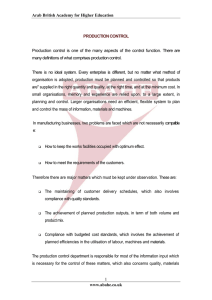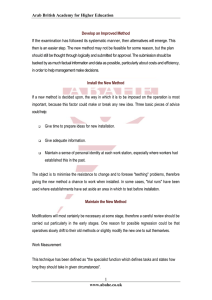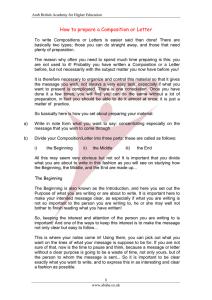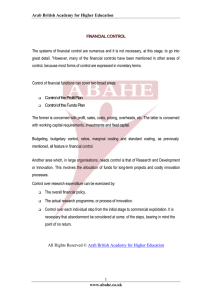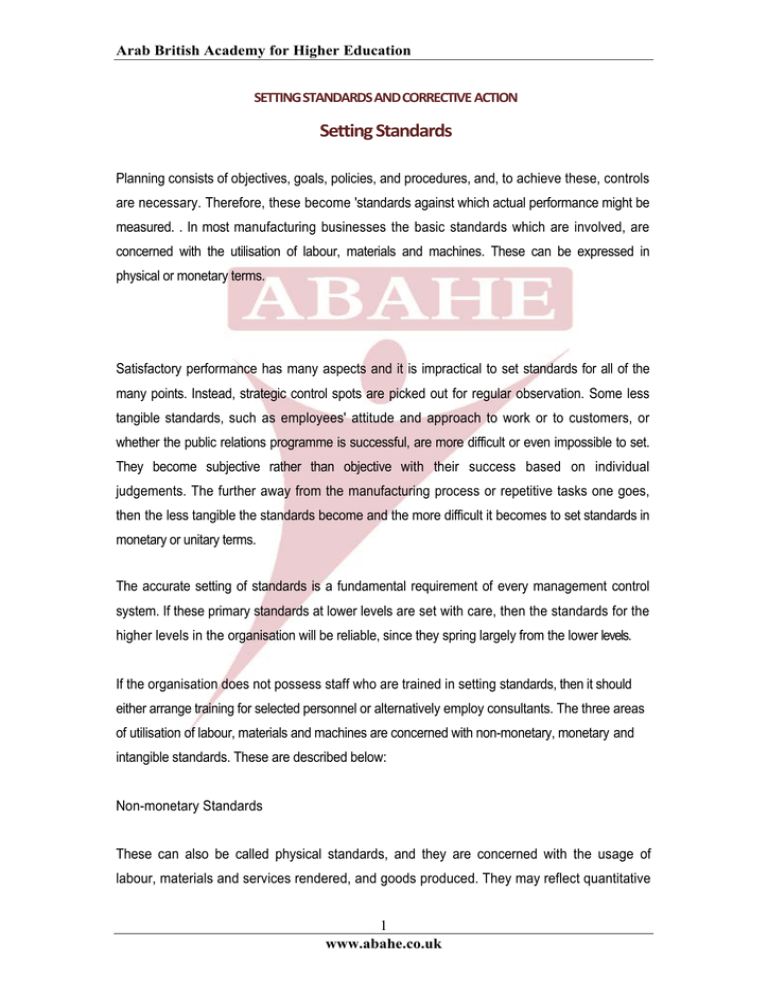
Arab British Academy for Higher Education
SETTING STANDARDS AND CORRECTIVE ACTION
Setting Standards Planning consists of objectives, goals, policies, and procedures, and, to achieve these, controls
are necessary. Therefore, these become 'standards against which actual performance might be
measured. . In most manufacturing businesses the basic standards which are involved, are
concerned with the utilisation of labour, materials and machines. These can be expressed in
physical or monetary terms.
Satisfactory performance has many aspects and it is impractical to set standards for all of the
many points. Instead, strategic control spots are picked out for regular observation. Some less
tangible standards, such as employees' attitude and approach to work or to customers, or
whether the public relations programme is successful, are more difficult or even impossible to set.
They become subjective rather than objective with their success based on individual
judgements. The further away from the manufacturing process or repetitive tasks one goes,
then the less tangible the standards become and the more difficult it becomes to set standards in
monetary or unitary terms.
The accurate setting of standards is a fundamental requirement of every management control
system. If these primary standards at lower levels are set with care, then the standards for the
higher levels in the organisation will be reliable, since they spring largely from the lower levels.
If the organisation does not possess staff who are trained in setting standards, then it should
either arrange training for selected personnel or alternatively employ consultants. The three areas
of utilisation of labour, materials and machines are concerned with non-monetary, monetary and
intangible standards. These are described below:
Non-monetary Standards
These can also be called physical standards, and they are concerned with the usage of
labour, materials and services rendered, and goods produced. They may reflect quantitative
1
www.abahe.co.uk
Arab British Academy for Higher Education
performance, such as standard labour hours per unit of output, weight of material per unit of
output, units of production per machine hour, etc. They may also reflect quality, for example,
type and weight per unit of output, closeness of tolerance, etc.
Monetary Standards
Because these standards are dealing with monetary measurement, they include:
Cost standards
Costs of varying types of labour, materials and selling are attached to the units of production,
or to the units of sales, or to hours worked. In the hotel and catering industry cost standards
can vary from the cost of labour per room cleaned to the cost of pastry per steak and kidney
pie.
Capital standards
These tend to be concerned with the balance sheet as opposed to the profit and loss
account. Return on investment, or ratios of current assets to current liabilities and debt to net
worth are typical examples.
Revenue standards
These are concerned with sales, for example, average sales per customer or Pounds per
dozen bottles sold.
Project standards
These include the monetary value attached to the cost of new projects or ideas. This involves
subjective judgement, but the objectives are either monetary or time constraints.
Intangible Standards
2
www.abahe.co.uk
Arab British Academy for Higher Education
These standards are the most difficult to set and they are often based on subjective
judgements, which are in turn based upon experience or previous results and performances.'
These may include standards of attitude, personality, cleanliness and general behaviour.
Therefore, the concern is with the human element, which plays a great part in the overall
performance, and it becomes difficult to measure that which is average, satisfactory or good.
It is important that these areas are controlled, and this is generally achieved by training and
the establishment of manuals and procedures.
These manuals can include what should be done, how, and by whom and to whom the
operative is responsible. It is obvious that this is more complex, nevertheless the attempt is to
lay down methods which can be measured. One can prepare manuals for receptionists,
which deal with guests, or manuals for kitchen operatives, which deal with hygiene. These
manuals are prepared to show the worker what to do, although a subjective judgement is
then required to measure it. Customer complaints and compliments provide feedback on
which appraisal can be based.
Appraising Performance
Some comparison of actual performance with control standards may be done made the
manager himself. This involves close supervision of the subordinates at the time of the
operation. It has been said that deviations are best reported and corrected as soon as
possible. Supervision expedites this.
Some control data are derived as a by-product of other record keeping. Such separation of
measuring performance from its evaluation and the necessary corrective action requires
control reports. The information must be communicated from person to person, and this raises
many questions:
What form should be used?
How much detail should they contain?
To whom should they be sent?
How often should they be sent?
Can
reports be simplified by dealing only with exceptions to standards?
3
www.abahe.co.uk
Arab British Academy for Higher Education
The effectiveness of control is usually increased by prompt reporting. If some undesirable
practice is taking place, it should be corrected quickly. Moreover, the cause of the trouble can
be learned better if people have not had too long a time to forget the circumstances. It is also
true that employees, knowing that a prompt check on deviations from standards will be made, are
more likely to be careful in their work.
Consequently, the sooner a control report reaches a manager, the more effective control will be.
Another practical issue of appraisal is whether "sampling" will provide adequate information.
Refined statistical techniques such as quality control can be used to decide the size of a
sample and the inferences which can be drawn from it. In some operations 100% observation
is essential. For certain key actions, for example, capital expenditures and executive
appointments, the manager may insist on giving his personal approval before performance
continues.
All Rights Reserved © Arab British Academy for Higher Education
4
www.abahe.co.uk

